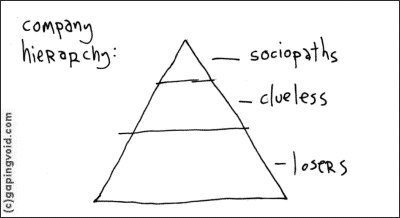In my last post, I talked about the Gervais Principle and the Company Hierarchy diagram:
Notice the huge bottom layer of “losers”. Losers isn’t necessarily this sort of loser:
But as Venkatesh Rao (inventor of the Gervais principle) explains, loser is more in the economic sense. You have this huge mass of people who give up their chance to fully participate in the economy to work at company. They gain the security of working for an employer in trade for doing as the company directs. In the sense that they have given up their economic autonomy, they are losers.
That term losers is so loaded isn’t it? Language contains the cultural cues that help us define our world. Gendered language keeps popping up for me in this blog and in my personal life. So this post is about how gendered language perpetuates losers by homogenizing (or flattening) out that bottom section of the triangle.
Let me give a specific example. Yahoo hosts Open Hack Days for developers that use their APIs. For the last couple of years (at least) the Open Hack Day in Taiwan has included “Hack Girls”. Not strippers really, sort of cheerleaders in skimpy outfits who dance like strippers with some of the participants. Yahoo apologized after there was an online outcry over pictures of the “Hack Girls”, and they promised it would never happen again.
This post isn’t about that event, or how Yahoo has responded. It is about the language used by the techies responding to the issue.Here are some of the responses to Yahoo’s apology:
- “We’re adults here, let’s act like one instead of acting like a little revealing clothing offended our Puritan hearts so much”
- “This is Taiwan… the other side of the world to you Americans. If China invaded would you care? Nope. But some dancing girls appear at a technology function and you’re all jumping up and down screaming about inappropriate behaviour. Again forcing your views on what’s morally right on the rest of the world.”
- “Honestly I think everyone is getting worked up over nothing. The fact remains that the majority of attendees at these events are men. Men like scantily clad women. It’s not hard to understand why they were there.”
- “Making a gigantic fuss and screaming about feminism is the problem. Hell, I’m a woman and it annoys me. Get over yourselves. If you think that the strippers at this event are undermining your talent, then obviously you’re not a very good developer.”
- “Women in IT who flaunt their intellects make it very uncomfortable for the hack girls who just want to be able to trade off their good <looks>. Get over yourselves”
The same sort of language is used every time someone brings up the issue of institutionalized discrimination against women in the IT industry. You will always hear variations of these words:
- Stop being so uptight
- Boys will be boys
- Only men show up, so what do you expect
- I’m a woman and I am ashamed of all women who speak up
- If you are complaining, you are obviously not an “awesome” enough coder/developer/engineer..
- Get over yourself
All of these words serve to marginalize those who point out discriminatory practices. Women who speak up are told to stop being uptight, embarrassing the other women, and their skills are called into question. Its almost like the only buckets for women in IT are a hot “Hack Girl”, a woman who is “one of the guys” who won’t speak up when she feels uncomfortable, or the angry feminazi who is always bringing everyone down.
The words are used over and over again. They are what permit these narrow views of what a woman in IT should be – they homogenize us all. They keep us all in that bottom loser category. Not just the women, but the men too. If you can’t see another type of woman, you’ve been homogenized too.
If we want to get to the point where we have a connected world, where we are able to make full use of everyone’s contributions, where the value networks that are constructed to get the work done include all workers, we have to start thinking about our language.
I challenge all of you to wrestle with these terms, with these definitions. I urge all of you to realize that the words we use to deal with the problem of the lack of woman in IT are huge indicators of the real underlying problem. Make it easy for women to speak up. If someone points out an obvious example of sexism, speak out against it! Don’t say, well that is an isolated example or yes but that is not why there are not women in IT.
I believe if we can change the language of oppression, we can work together to eliminate that loser section of the triangle, and move instead to a more connected way of management and working.








Excellent excellent post!
Mel.
an offensive start to get attention. and then crywolf on you personal points. nice.
now, moving along.
asdfg thanks for proving my point!
Well said!
One aspect that I think is often overlooked is the *decline*, I would say precipitous, of women in technology. 20+ years ago there were proportionally far more women than there are now. We’re being driven out, and Yahoo’s is the kind of behavior that’s causing it.
Pingback: links for 2009-10-22 « Amy G. Dala
Pingback: Best of e-learning « Ramblings from Africa
Pingback: My top 10 posts of 2009 | Adventures in Corporate Education